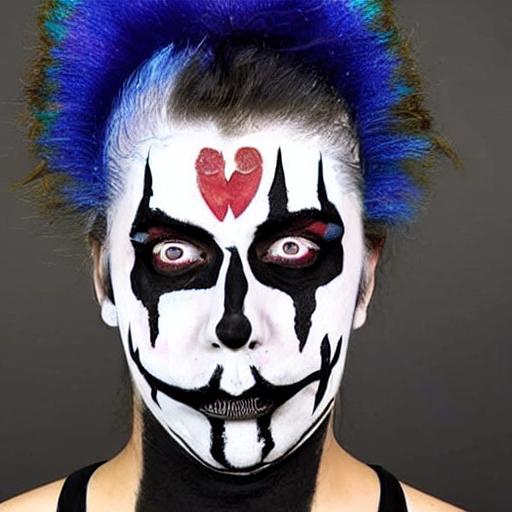What if the Qatar World Cup’s best facial recognition technology could be tricked by a little face paint?
With the help of AI-generated, Juggalo-inspired face paint designs that could be used to avoid facial recognition cameras, the Camoflags team attempted to provide an answer to that question.
The experiment is especially appropriate for the World Cup because fans frequently use face paint to support their teams at soccer games.
The Qatar World Cup, which concludes on December 18, has drawn criticism for its approach to security due to worries that it could turn into a hub for espionage and that attendees’ phones could be tracked via app surveillance.
The event has also drawn criticism for violating human rights: The passing of American sports journalist Grant Wahl, who passed away on the way to the hospital after collapsing at the World Cup stadium, brought LGBTQ rights in Qatar to the forefront of the public’s consciousness. Authorities had previously detained Wahl outside the World Cup stadium for donning a rainbow-colored shirt.
According to AFP, approximately 15,000 facial recognition cameras have been installed inside and outside the stadium to detect “hooliganism” and terrorist threats.
What you see is their contribution from Qatar to the sporting world—a new benchmark and a cutting-edge style in venue operations. The stadium operations of the future are what you see here, told AFP, Niyas Abdulrahiman.
One of the Camoflags team members, Tao Thomsen, told that the team came up with the idea to test facial recognition years ago in response to the rising popularity of deepfakes of women made without their consent. Camoflags is a project of the creative agency Virtue. The project’s original goal was to develop makeup looks that deepfake AI technology couldn’t identify on women, shielding their faces from being used in sexually explicit or non-consensual videos.
It’s not novel to consider using face makeup to try to trick facial recognition algorithms. One of the first attempts to defeat artificial intelligence (AI) by using geometrical shapes and other gimmicks was Adam Harvey’s 2010 project CV Dazzle. There is some proof that Juggalo makeup, which consists of clown-like makeup inspired by the hip-hop group Insane Clown Posse, is especially good at fooling facial recognition software.
The difficulty with projects like these, according to Thomsen, was their practical application. The team understood that asking women to always wear “crazy” makeup combinations would be challenging. It was different with soccer though.
Because, according to Thomsen, a [soccer] match is one place where it’s okay to wear weird patterns on your face. People are expecting you to paint your face with flags, team colours, and other symbols.
Camoflags fed a series of descriptions to an AI art tool called Midjourney AI in order to produce designs with the ideal combination of Juggalo make-up and different flags. This resulted in the ideal shape.
Thomsen explained, they gave it these descriptions and then ran that process many times until they got a result that couldn’t be recognized as a face when they ran it through face recognition software. And then they knew they had a little bit of human love afterward to tidy things up and make sure [the patterns] are also aesthetically functional because generative AI does start to hallucinate and make some really weird stuff.
The team tested the various Juggalo and flag-patterned make-up designs on different consumer-grade facial recognition tech — the actual facial camera system used in Qatar is unknown to the public — and discovered that many of the designs could elude cameras.
The team calculates that roughly 80% of the tests on the 10 systems were successful.
Camoflags believes that their face paint designs will help start a discussion about surveillance at sporting events, even though they are not aware of any adopters of their designs at the World Cup as of yet and advise people not to test their limits in Qatar for fear of getting in trouble.
Using face paint, users could color them out a little bit like a drawing book with virtual Juggalo designs placed on them, according to Morten Grubak, another team member at Camoflags.
Thomsen specifically mentioned the UK, where soccer fans have already had to deal with problematic facial recognition. Sports venues all over the world have started using facial recognition technology to verify ticket holders for entry at events, identify people engaging in illegal activity, and collect data for advertisements.
Additionally, there is proof that facial recognition technology may not accurately identify women and people of colour, which may cause law enforcement to mistake them for criminals.
They are hoping that this can be used as a tool for soccer fans everywhere to take a stand against facial recognition because they know that there’s a big percentage of [soccer] fans, particularly in the UK, who are very outspoken about their distrust and their dislike of it, said Thomsen.













